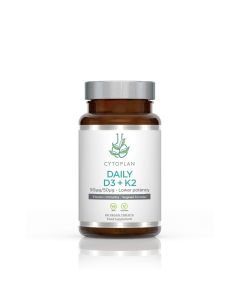The eight B vitamins function in many different ways to help enzymes carry out thousands of molecular conversions in the body and are therefore known as co-enzymes.
The B complex vitamins provide the body with energy by aiding conversion of carbohydrates to glucose, which the body "burns" to produce energy. They are also vital for the metabolism of fats and protein and many act as cofactors in energy production. A deficiency or suboptimal levels of B vitamins can lead to reduced energy levels and fatigue.
B vitamins are necessary for the normal functioning of the nervous system and brain as well as contributing to normal psychological function. They are also essential for the maintenance of muscle tone in the gastrointestinal tract and for the health of the skin, hair, eyes, mouth and liver.
All B vitamins are water soluble substances. This means that any excess is excreted and not stored so they must be continually replaced, hence the need for vitamin b supplements. The excretion or metabolism of B vitamins is increased by exercise, sweating and with certain medications. It is also important to note that some B vitamins are manufactured by the intestinal flora, hence gastrointestinal dysfunction may increase the requirement for vitamin Bs.
B vitamins all work synergistically, supporting the function of each other. Grouping the B vitamins (B1,2,3,5,6,12, Biotin and folic acid) into a vitamin B complex is important as they complement each other in their functions, particularly when optimising energy levels, nervous and psychological function or general wellness.
In specific circumstances individuals may need a specific B vitamin in isolation. We therefore have the option of both B vitamin complexes and singular nutrients, still ensuring they are in the most bio effective form. As the B vitamin work synergistically however, it may be advisable to take singular B vitamin alongside a B complex. Hence, singular nutrients may be taken on their own or although preferably in combination with a B complex, particularly if taking long-term, (note that in normal circumstances B vitamins should be taken together).
At Cytoplan we aim to provide our B vitamins in the most bio-effective form (the form which is most effectively absorbed and utilised but he body). This is essential for the absorption, function and utilisation of vitamin B supplements within the body.
We ensure that:
- B1 is provided as benfiotaimine or thiamin
- B2 is provided as riboflavin
- Our B3 capsules are available as either niacinamide or nicotinamide riboside
- Vitamin B5 is in the form of pantothenic acid
- Vitamin B6 is provided as a P5P supplement
- Folic acid is in a food-based form of folate, as l-methylfolate or as 5-methyltetrahydrofolate (5-MTHF)
- Vitamin B12 is available as methyl cobalamin (methylated B12) with adenosyl cobalamin or as hydroxocobalamin tablets. Our individual B12 supplements are sublingual and therefore bypass the need for intrinsic factor to be adequately produced by the parietal cells in the stomach. This should be considered when you buy B12 vitamins.
This philosophy aids the utilisation of B vitamin supplements to ensure optimal levels of all B vitamins can be obtained.
Is it better to take a B complex?
What is vitamin B for?
Who is likely to have B vitamin deficiency?
What is your best vitamin B complex?
The preferred vitamin B complex depends on individual needs. However, the Cytoplan Multi B Extra is a good starting point to optimise intake of B vitamins.
Why should I take a B vitamin complex?
B vitamins are water soluble and therefore are not stored by the body and need to be replaced daily. It can be difficult to obtain optimal levels due to depleted levels in food, choosing the right food types or processing of foods, such as milling of flour, which reduces B vitamin content. Additionally, those choosing vegan diets can find it difficult to obtain B12.
B vitamins are essential for multiple processes in the body including energy production as well as normal nervous system and brain health. They are also essential for the maintenance of muscle tone in the gastrointestinal tract and for the health of the skin, hair, eyes, mouth and liver.
Is choline bitartrate a B vitamin?
What is the difference between methyl, adenosyl, hydroxo and cyano cobalamin?
Methyl cobalamin is a form of B12 which has been methylated (a methyl-CH3 group added to it), this form is active in the body and some people are unable to methylate B12 so should obtain B12 as methyl cobalamin form. Adenosyl cobalamin is also active in the body, it is methyl cobalamin that has had been methylated again. This form is important as some individuals lack the enzymes to do this themselves.
Methyl and adenosyl are preferred forms as a supplement as they do not need to be converted or activated in the body. Hydroxocobalamin is a food-based form of B12, and is suitable for those that are sensitive to high amounts of methyl groups. It is generally well converted to methyl cobalamin in the body, unless individuals lack the enzymes (have genetic polymorphisms) to be able to do this, in which case methyl and adenosyl cobalamin is recommended. Cyanocobalamin is a cheaper form of B12 and is poorly converted, Cytoplan do not provide B12 in this form.
What is the best form of folic acid?
Synthetic folic acid (monoglutamate) can block the function of natural folate, therefore it is not recommended as a supplement. Methylfolate is the active form of folic acid that is well utilised by the body. Individuals with certain genetics may lack the enzymes to activate convert folate into methylfolate and therefore should supplement as the already activated l-methylfolate or 5-methyltetrahydrofolate (5-MTHF) forms. Some individuals may be sensitive to methyl donors (nutrients such as methyl folate or methyl cobalamin which donate a methyl - CH3 group) and therefore should opt for a polyglutamate folic acid, a food based form. Cytoplan folic acid is in either methylfolate or food-based folate form, which are gentle and safe.










